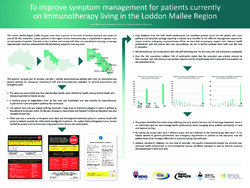Please use this identifier to cite or link to this item:
http://hdl.handle.net/11054/1370| Title: | To improve symptom management for patients currently on immunotherapy living in the Loddon Mallee region. |
| Author: | Bartlett, Suzanne |
| Issue Date: | 2019 |
| Conference Name: | ONS 44th Annual Congress |
| Conference Date: | April 10-14 |
| Conference Place: | Anaheim, United States of America |
| Abstract: | The Loddon Mallee Region occupies more than a quarter of the state of Victoria-Australia and covers an area of 58,961 square kilometres. Cancer patient’s in this region receive immunotherapy as outpatients in regional, rural or metropolitan hospitals. They rely on local medical and nursing staff often not specialised in oncology to manage unpredictable and potentially life-threatening symptoms that may arise. The project’s purpose was to increase local health care professionals’ awareness and management of the symptoms of immunotherapy by developing and trialling a specific immunotherapy patient alert card and an immunotherapy patient pathway for emergency department staff and immunotherapy education for general practitioners and emergency staff. The resources were trialled across four health care services to include; Bendigo Health Cancer Centre, Swan Hill District Health, Kerang District Health and Maryborough District Health Service. A working group of stakeholders from all sites was established and met monthly by teleconference. A patient alert card and patient pathway was developed. Emergency Department and General Practitioner Education was provided at the four sites. Emergency staff and general practitioners found the education on immunotherapy and immune related adverse events beneficial with 85% of respondents identifying a better understanding of immunotherapy after the education. The Bendigo Health emergency department informed the emergency category for the patient alert card. The project identified that while immunotherapy has very quickly become part of oncology treatment, there is an information gap for non-oncology health professional when managing these patients particularly in rural and regional settings. By making the patient alert card a different colour and very different to the chemotherapy alert card – it has helped identify to general practitioners and emergency departments in addition to the education that the patient needs to be managed differently to someone having chemotherapy. While we are just rolling out the patient alert card and pathway within the region we have had encouraging support from relevant health professionals. We aim to review the implementation of both these in the next six-twelve months using a patient quality of life tool and a pre and post questionnaire. Immune checkpoint inhibitors are very new in Australia. This quality improvement project has ensured non-oncology health professionals in non-metropolitan settings are better equipped to care for patients receiving immunotherapy in their local area. |
| URI: | http://hdl.handle.net/11054/1370 |
| Internal ID Number: | 01349 |
| Health Subject: | IMMUNOTHERAPY PATIENT ALERT CARD IMMUNOTHERAPY PATIENT PATHWAY RURAL AND REGIONAL SETTINGS NON-ONCOLOGY HEALTH PROFESSIONALS IMMUNE CHECKPOINT INHIBITORS |
| Type: | Conference Poster |
| Appears in Collections: | Research Output |
Files in This Item:
| File | Description | Size | Format | |
|---|---|---|---|---|
| ONS Poster ART.final.pdf | 3.95 MB | Adobe PDF |  View/Open |
Items in DSpace are protected by copyright, with all rights reserved, unless otherwise indicated.
